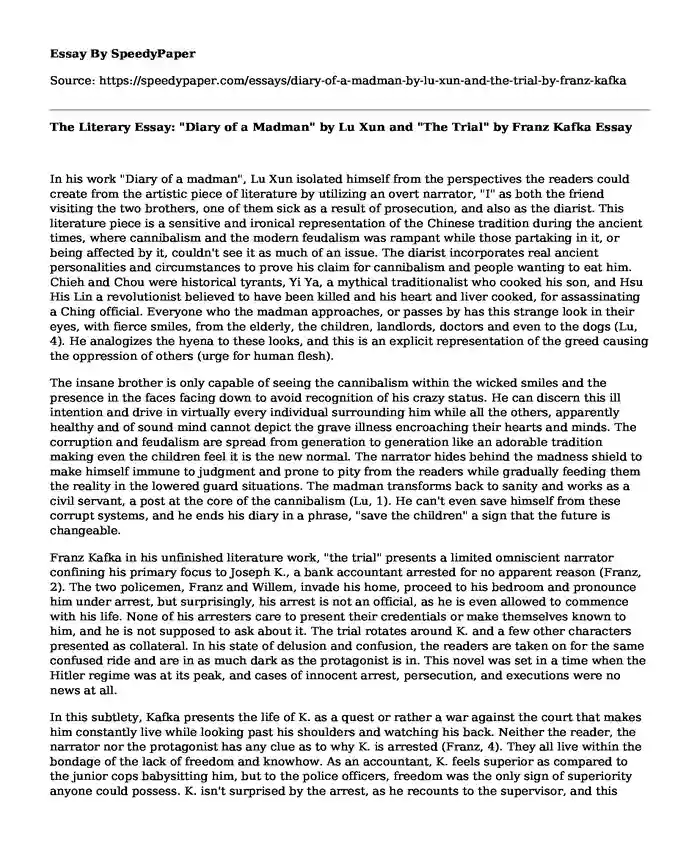
| Type of paper: | Essay |
| Categories: | World literature |
| Pages: | 3 |
| Wordcount: | 671 words |
In his work "Diary of a madman", Lu Xun isolated himself from the perspectives the readers could create from the artistic piece of literature by utilizing an overt narrator, "I" as both the friend visiting the two brothers, one of them sick as a result of prosecution, and also as the diarist. This literature piece is a sensitive and ironical representation of the Chinese tradition during the ancient times, where cannibalism and the modern feudalism was rampant while those partaking in it, or being affected by it, couldn't see it as much of an issue. The diarist incorporates real ancient personalities and circumstances to prove his claim for cannibalism and people wanting to eat him. Chieh and Chou were historical tyrants, Yi Ya, a mythical traditionalist who cooked his son, and Hsu His Lin a revolutionist believed to have been killed and his heart and liver cooked, for assassinating a Ching official. Everyone who the madman approaches, or passes by has this strange look in their eyes, with fierce smiles, from the elderly, the children, landlords, doctors and even to the dogs (Lu, 4). He analogizes the hyena to these looks, and this is an explicit representation of the greed causing the oppression of others (urge for human flesh).
The insane brother is only capable of seeing the cannibalism within the wicked smiles and the presence in the faces facing down to avoid recognition of his crazy status. He can discern this ill intention and drive in virtually every individual surrounding him while all the others, apparently healthy and of sound mind cannot depict the grave illness encroaching their hearts and minds. The corruption and feudalism are spread from generation to generation like an adorable tradition making even the children feel it is the new normal. The narrator hides behind the madness shield to make himself immune to judgment and prone to pity from the readers while gradually feeding them the reality in the lowered guard situations. The madman transforms back to sanity and works as a civil servant, a post at the core of the cannibalism (Lu, 1). He can't even save himself from these corrupt systems, and he ends his diary in a phrase, "save the children" a sign that the future is changeable.
Franz Kafka in his unfinished literature work, "the trial" presents a limited omniscient narrator confining his primary focus to Joseph K., a bank accountant arrested for no apparent reason (Franz, 2). The two policemen, Franz and Willem, invade his home, proceed to his bedroom and pronounce him under arrest, but surprisingly, his arrest is not an official, as he is even allowed to commence with his life. None of his arresters care to present their credentials or make themselves known to him, and he is not supposed to ask about it. The trial rotates around K. and a few other characters presented as collateral. In his state of delusion and confusion, the readers are taken on for the same confused ride and are in as much dark as the protagonist is in. This novel was set in a time when the Hitler regime was at its peak, and cases of innocent arrest, persecution, and executions were no news at all.
In this subtlety, Kafka presents the life of K. as a quest or rather a war against the court that makes him constantly live while looking past his shoulders and watching his back. Neither the reader, the narrator nor the protagonist has any clue as to why K. is arrested (Franz, 4). They all live within the bondage of the lack of freedom and knowhow. As an accountant, K. feels superior as compared to the junior cops babysitting him, but to the police officers, freedom was the only sign of superiority anyone could possess. K. isn't surprised by the arrest, as he recounts to the supervisor, and this shows that such forms of injustices were quite common.
Works cited
Franz Kafka. The trial. Verlag Die Schmiede, Berlin. 1925. Pp. 1-37
Lu Xun. Diary of a madman. 1917. Pp. 1-8
Cite this page
The Literary Essay: "Diary of a Madman" by Lu Xun and "The Trial" by Franz Kafka. (2022, Jun 24). Retrieved from https://speedypaper.com/essays/diary-of-a-madman-by-lu-xun-and-the-trial-by-franz-kafka
Request Removal
If you are the original author of this essay and no longer wish to have it published on the SpeedyPaper website, please click below to request its removal:
- Free Essay Example on Sexual Abuse in Adulthood
- Free Essay Example: Classification of Art
- Essay Sample about the Lucy Story
- Between The World and Me - Literary Essay Sample for Free
- Essay Sample at No Charge: SWOT Analysis of Uber
- Essay Sample: Adverse Selection and Moral Hazard in Health Insurance
- Free Essay Example. Impact of Ethical Leadership in Project Management
Popular categories




